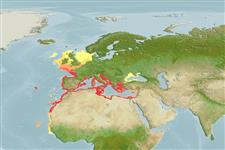Preferred temperature (Ref.
115969): 12.2 - 21, mean 17.2 (based on 492 cells).
Fylogenetische diversiteitsindex (Ref.
82804): PD
50 = 0.5156 [Uniqueness, from 0.5 = low to 2.0 = high].
Bayesian length-weight: a=0.01000 (0.00901 - 0.01109), b=3.02 (2.99 - 3.05), in cm Total Length, based on LWR estimates for this species (Ref.
93245).
Trofisch niveau (Ref.
69278): 3.5 ±0.1 se; based on diet studies.
Weerstandsvermogen (Ref.
120179): Gemiddeld, minimale populatieverdubbelingstijd 1,4-4,4 jaar (K=0.24; tm=1-2; tmax=13; Fec=31,000).
Prior r = 0.54, 95% CL = 0.35 - 0.80, Based on 8 full stock assessments.
Fishing Vulnerability (Ref.
59153): Moderate vulnerability (40 of 100).
Climate Vulnerability (Ref.
125649): Moderate vulnerability (41 of 100).
